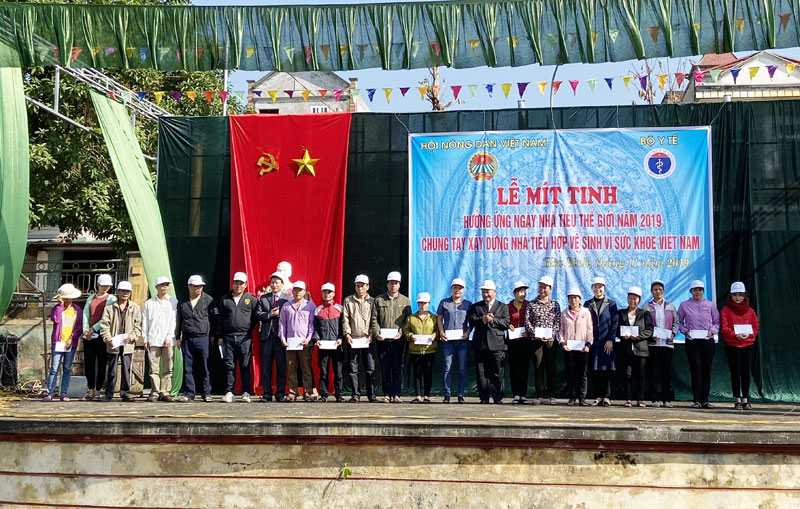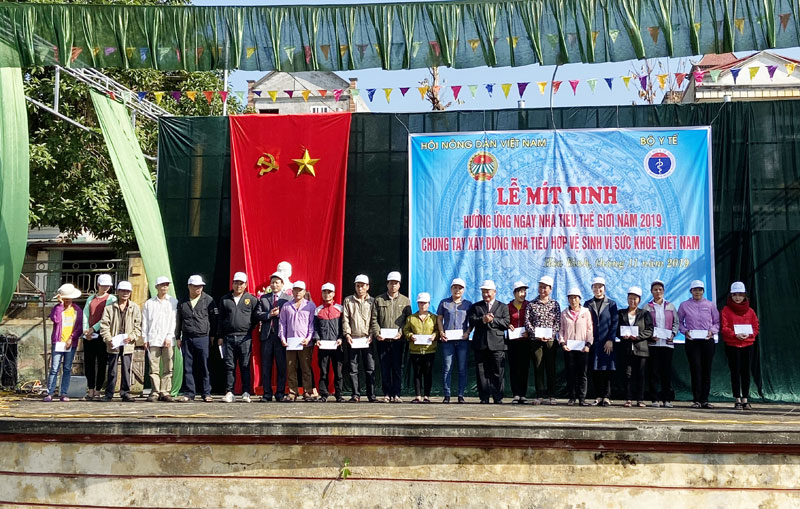
(HBO) - On November 15th, in Dung Phong Commune (Cao Phong), Vietnam Farmers’ Union and the Agency of Environmental Management, the Ministry of Health collaborated with the Provincial Farmers' Union to organize a meeting to respond to the World Toilet Day, November 19th.
The representatives of the People's Committee of the province, Vietnam Farmers’ Union and the party committee of Cao Phong district have donated money to support 20 households of the Union members in 11 communes and the town of Cao Phong district without the hygienic latrines.
The representatives of the Agency of Environmental Management, the Ministry of Health, the leaders from Vietnam Farmers’ Union took part in the meeting. From the provincial side, Mr. Bui Van Cuu, the Vice Chairman of the Provincial People's Committee, the leaders of other departments, and appropriate authorities from the province, from Cao Phong district and 310 farmers coming from 11 communes and the town of Cao Phong district also attended the meeting.
This year, the purpose of the World toilet day is "Hygiene to improve people's health”. The aim is to call for the attention and priority of the committees and authorities for the rural sanitation and to promote the cooperation and the coordination to raise the people's awareness, calling for building and using hygienic latrines. According to the report of the Department of Health, up to September 2019, there is a total of 213,066 households in our province, the households with latrines are 210,616 (accounting for 98.85%), of which the number of households with hygienic latrines is 78.45 %.
Due to the low awareness and habits of personal hygiene and environmental sanitation, especially the construction, there are still some households who do not pay much attention to using and preserving hygienic latrines. The indiscriminate defecation still exists in some rural areas, which is one of the causes of diarrhea and pneumonia, two diseases that can be fatal.
At the meeting, the representatives of the People's Committee of the province, Vietnam Farmers’ Union and the Party Committee of Cao Phong district gave money to support 20 households in 11 communes and the town of Cao Phong that do not have hygienic latrines. The support is 1 million VND each household to build the hygienic latrines, contributing to ensure the family sanitation and improve the local rural environment.
The emulation movement "Hoa Binh joining hands to build new-style rural areas” has been widely spreading, becoming a driving force that motivates the localities to renew rural landscapes and improve the material and spiritual lives of the residents. In this movement, the people play a central role-both as the main implementers and direct beneficiaries of its outcomes.
In response to the global digital revolution, Hoa Binh Newspaper is transforming itself into a modern and multi-platform media hub, blending cutting-edge technology with a restructured newsroom and a new generation of tech-savvy journalists.
Hoa Binh province’s Association of the Elderly recently held a conference to review the project on expanding the inter-generation self-help club model until 2025.
In a move to implement Resolution No. 57-NQ/TW, issued on December 22, 2024 by the Politburo, which targets breakthroughs in science-technology development, innovation, and digital transformation, the Hoa Binh provincial Department of Health has issued a plan to roll out the "Digital Literacy for All” campaign within the local health sector.
An Nghia Commune (Lạc Sơn District) is one of the communes that achieved the tha standard of the national new rural area in 2018. Entering a new development phase, the commune is now trying to meet the criteria for the advanced new rural development. With the strong political will and the public consensus, the commune is gradually overcoming the challenges to reach this goal, aiming for the sustainable development.



